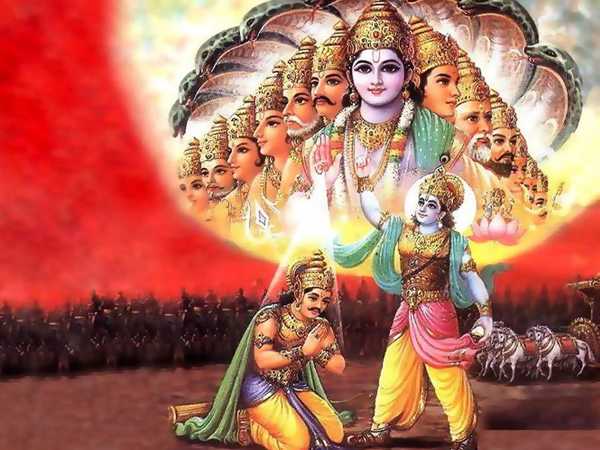Chapter 21

“The Brahmana said, ‘In this connection is cited the following ancientstory. Do thou understand, of what kind the institution is of the tenHotris (sacrificing priests). The ear, the skin, the two eyes, thetongue, the nose, the two feet, the two hands, the genital organ, thelower duct, and speech,–these, O beautiful one, are the ten sacrificingpriests. Sound and touch, colour and taste, scent, speech, action,motion, and the discharge of vital seed, of urine and of excreta, are theten libations. The points of the compass, Quarters, Wind, Sun, Moon,Earth, Fire, Vishnu, Indra, Prajapati, and Mitra,–these, O beautifulone, are the ten (sacrificial) fires. The ten organs (of knowledge andaction) are the sacrificing priests. The libations, O beautiful one, areten. The objects of the senses are the fuel that are cast into these tenfires,[54] as also the mind, which is the ladle, and the wealth (viz.,the good and bad acts of the sacrificer). What remains is the pure,highest knowledge. We have heard that all this universe was welldifferentiated (from Knowledge). All objects of knowledge are Mind.Knowledge only perceives (i.e., discovers the Mind without being attachedto it). The knower (or Jiva), encased in subtle form, lives within thegross body that is produced by the vital seed. The bearer of the body isthe Garhapatya fire. From that is produced another. Mind is the Ahavaniyafire. Into it is poured the oblation. From that was produced the Veda (orWord); (then was born Mind); Mind (desirous of creation) sets itself onthe Veda (or the Word). Their arises form (or colour) undistinguished byparticular colours. It runs towards the Mind.'”[55]
“The Brahmana’s wife said, ‘Why did Word first arise and why did Mindarise afterwards, seeing that Word starts into existence after havingbeen thought upon by Mind? Upon that authority can it be said that Mati(Prana) takes refuge in Mind. Why, again, in dreamless slumber, thoughseparated from Mind, does not Prana apprehend (all objects)? What is thatwhich restrains it then?'”[56]
“The Brahmana said, ‘The Apana breath, becoming the lord (i.e., bringingthe Prana under its control), in consequence of such lordship over it,makes it identical with itself. That restrained motion of the Pranabreath (which for the time becomes identical with that of the Apana) hasbeen said to be the motion of the mind. Hence the mind is dependent uponPrana, not Prana upon the mind. Therefore, in dreamless slumber, upon thedisappearance of mind, Prana does not disappear. But since thou askest mea question about word and mind, I shall, therefore, relate to thee adiscourse between them. Both Word and Mind, repairing to the Soul ofmatter,[57] asked him,–Do thou say who amongst us is superior. Do thou,O puissant one, dispel our doubt.–On that occasion, the holy one madethis answer.–The mind undoubtedly (is superior). Unto him Word said,–‘Iyield to thee the fruition of all thy desires!'[58]
“The Brahmana said, ‘Know that I have two minds, immovable and movable.That which is immovable is, verily, with me; the movable is in yourdominion.[59] That mind is verily called movable which, in the form ofMantra, letter, or voice, is referable to your dominion. Hence, thou artsuperior (to the other mind which concerns itself with only the externalworld). But since, coming of thy own accord, O beautiful one, thouenterest into the engagement (about the fruition of all wishes),therefore, filling myself with breath, I utter thee.[60] The goddess Wordused always to dwell between Prana and Apana. But, O blessed one, sinkinginto Apana, though urged upwards, in consequence of becoming dissociatedfrom Prana, she ran to Prajapati and said,–Be gratified with me, O holyone.–The Prana appeared, once more fostering Word. Hence, Word,encountering deep exhalation, never utters anything. Word always flows asendued with utterance or unendued with it.[61] Amongst those two, Wordwithout utterance is superior to Word with utterance. Like a cow enduedwith excellent milk, she (Word without utterance) yields diverse kinds ofmeaning. This one always yields the Eternal (viz., Emancipation),speaking of Brahman. O thou of beautiful smiles, Word is a cow, inconsequence of her puissance which is both divine and not divine. Beholdthe distinction of these two subtle forms of Word that flow.'”[62]
“The Brahmana’s wife said, ‘What did the goddess of Word then say, indays of old, when, though impelled by the Wish to speak, Speech could notcome out?'”
“The Brahmana said, ‘The Word that is generated in the body by Prana,then attains to Apana from Prana. Then transformed into Udana and issuingout of the body, envelops all the quarters, with Vyana. After that, shedwells in Samana. Even in this way did Word formerly speak. Hence Mind,in consequence of being immovable, is distinguished, and the goddessWord, in consequence of being movable, is also distinguished.”‘




